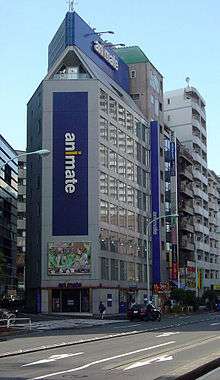Otome Road
Otome Road (乙女ロード Otome Rōdo, lit. Maiden Road) is a nickname for a street in Ikebukuro – a district of Tokyo – which is located to the west of the Sunshine 60 building near Ikebukuro Station. The name originated in the May 2004 issue of Puff magazine.[1] The name is derived from a dense grouping of shops that specialize in "Otome-kei" (anime and dōjinshi aimed at women) merchandise, all on one side of a roughly 200 meter corridor. Frequenters have more bluntly called the area "Fujoshi Street".
The area's media visibility increased though the 2005 film Densha Otoko, which presented Ikebukuro, represented by Otome Road, as the female otaku's town corresponding to Akihabara, the male otaku's town.
As it is only a small area of a larger commercial district it does not have frequenters who walk around in cosplay, and it is difficult to distinguish from other streets.
Development
Since the latter half of the 1980s there have been Animate and Animepolis anime goods stores in the vicinity of Ikebukuro Station. Anime goods sales skew towards women, and Ikebukuro is a comparatively better environment for attracting female customers than Akihabara or Nakano Broadway. However, because few products aimed at women had been developed at that point, and the dōjinshi shop in Sunshine City (Comics Revolution) stocked few women's dōjinshi, the demographic was the usual male-dominated one.
Just as when Akihabara became the haven for male otaku and shops giving prominent placement to male-oriented products increased, female-oriented product offerings are becoming the cornerstone of the development of Otome Road. The Animate there reopened after remodeling in 2000 with a strong emphasis on the women's sales base, and in the same year the nearby K-Books changed its product offerings to specialize in doujinshi aimed at women. For these reasons, the area is compared to Akihabara, which refocused to meet the needs of its customers.
See also
References
- ↑ Galbraith, Patrick W. (2011). "Fujoshi: Fantasy Play and Transgressive Intimacy among "Rotten Girls" in Contemporary Japan". Signs. 37 (1): 211–232. doi:10.1086/660182.
External links
| Wikimedia Commons has media related to Otome Road. |
- Town Guide Ikebukuro Otome Road (Japanese)
- "Otome Road and Doujinshi" - Ramblings of DarkMirage (English guide to the above map)
